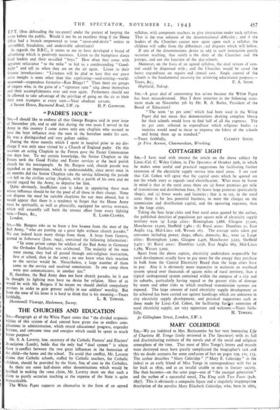CO'TTAGERS' LIGHT
Sm,—I have read with interest the article on the above subject by Lieut.-Col. C. Waley Cohen, in The Spectator of October 29th, in which he makes some useful and practical suggestions for facilitating further extension of the electricity supply service into rural areas. I am sure that Col. Cohen will agree that the capital costs which he quoted are not the whole story as regards rural electrification. What must be borne in mind is that in the rural areas there are (a) fewer premises per mile of transmission and distribution lines, (b) fewer large premises (particularly shops), and (c) fewer works and factories ; that is to say, in the rural areas there is far less potential business, to meet the charges on the uanmission and distribution capital, and the operating expenses, than in the large cities.
Taking the four large cities and four rural areas quoted by the author, the published densities of population per square mile of electricity supply territory were (a) Large cities: Birmingham 5,888, Glasgow 37,000, Manchester 15,000, Sheffield 7,480 ; (b) Rural areas: Dumfries 51, East Anglia 114, Mid-Lints 1(28, Wessex 163. The average units taken per consumer including power, shops, offices, domestic, &c., were (a) Large cities: Birmingham 3,090, Glasgow 2,406, Manchester 3,025, Sheffield 3,470; (b) Rural areas: Dumfries i,o58, East Anglia 663, Mid-Lints 1,589, Wessex r,000.
Apart from the above aspects, electricity undertakers responsible for rural development usually have to pay more for the energy they purchase in bulk from the Central Electricity Board than the large cities have to pay. Also it is obviously more expensive to maintain an overhead system spread over thousands of square miles of rural territory, than a typical underground system contained within the compass of a city and its suburbs, particularly having regard to the greater risks of damage by storm and other risks to which overhead transmission systems are exposed. The large amount of rural electricity supply development so far achieved has been carried out against handicaps which are unknown in city electricity supply development, and practical suggestions such as those made by Lieut.-Col. Cohen, for facilitating further extension of rural electricity supply, are very opportune and welcome.—Yours faith- fully,
3o Gillingham Street, London, S.W. 1. H. TOWERS.


























 Previous page
Previous page